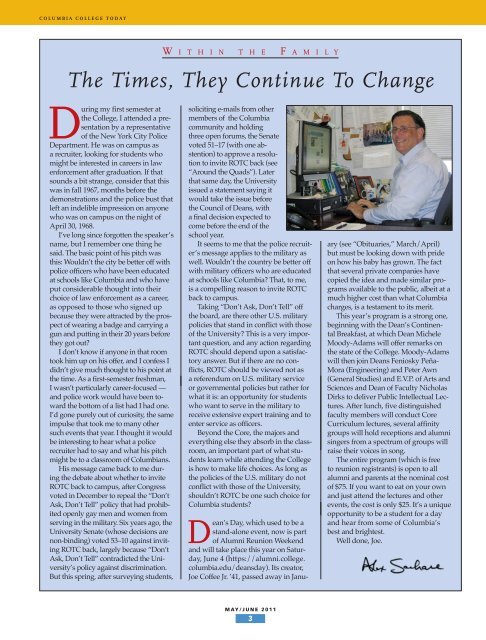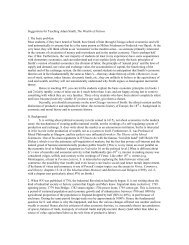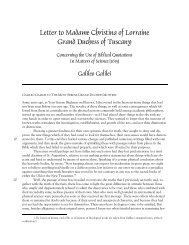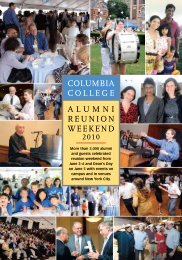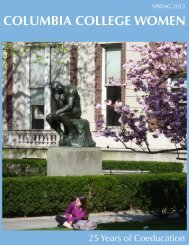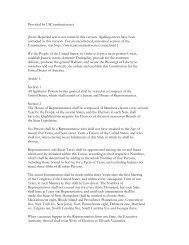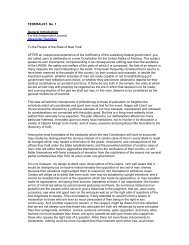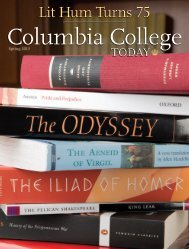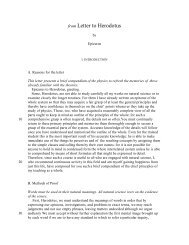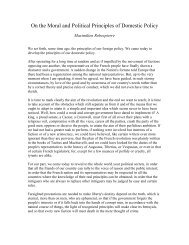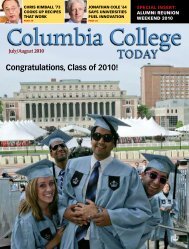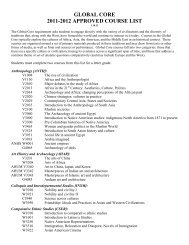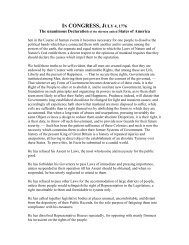A Passion for Science - Columbia College - Columbia University
A Passion for Science - Columbia College - Columbia University
A Passion for Science - Columbia College - Columbia University
Create successful ePaper yourself
Turn your PDF publications into a flip-book with our unique Google optimized e-Paper software.
<strong>Columbia</strong> CollEgE Today<br />
during my first semester at<br />
the <strong>College</strong>, I attended a presentation<br />
by a representative<br />
of the New York City Police<br />
Department. He was on campus as<br />
a recruiter, looking <strong>for</strong> students who<br />
might be interested in careers in law<br />
en<strong>for</strong>cement after graduation. If that<br />
sounds a bit strange, consider that this<br />
was in fall 1967, months be<strong>for</strong>e the<br />
demonstrations and the police bust that<br />
left an indelible impression on anyone<br />
who was on campus on the night of<br />
April 30, 1968.<br />
I’ve long since <strong>for</strong>gotten the speaker’s<br />
name, but I remember one thing he<br />
said. The basic point of his pitch was<br />
this: Wouldn’t the city be better off with<br />
police officers who have been educated<br />
at schools like <strong>Columbia</strong> and who have<br />
put considerable thought into their<br />
choice of law en<strong>for</strong>cement as a career,<br />
as opposed to those who signed up<br />
because they were attracted by the prospect<br />
of wearing a badge and carrying a<br />
gun and putting in their 20 years be<strong>for</strong>e<br />
they got out?<br />
I don’t know if anyone in that room<br />
took him up on his offer, and I confess I<br />
didn’t give much thought to his point at<br />
the time. As a first-semester freshman,<br />
I wasn’t particularly career-focused —<br />
and police work would have been toward<br />
the bottom of a list had I had one.<br />
I’d gone purely out of curiosity, the same<br />
impulse that took me to many other<br />
such events that year. I thought it would<br />
be interesting to hear what a police<br />
recruiter had to say and what his pitch<br />
might be to a classroom of <strong>Columbia</strong>ns.<br />
His message came back to me during<br />
the debate about whether to invite<br />
ROTC back to campus, after Congress<br />
voted in December to repeal the “Don’t<br />
Ask, Don’t Tell” policy that had prohibited<br />
openly gay men and women from<br />
serving in the military. Six years ago, the<br />
<strong>University</strong> Senate (whose decisions are<br />
non-binding) voted 53–10 against inviting<br />
ROTC back, largely because “Don’t<br />
Ask, Don’t Tell” contradicted the <strong>University</strong>’s<br />
policy against discrimination.<br />
But this spring, after surveying students,<br />
W i t h i n t h e F a m i l y<br />
The Times, They Continue To Change<br />
soliciting e-mails from other<br />
members of the <strong>Columbia</strong><br />
community and holding<br />
three open <strong>for</strong>ums, the Senate<br />
voted 51–17 (with one abstention)<br />
to approve a resolution<br />
to invite ROTC back (see<br />
“Around the Quads”). Later<br />
that same day, the <strong>University</strong><br />
issued a statement saying it<br />
would take the issue be<strong>for</strong>e<br />
the Council of Deans, with<br />
a final decision expected to<br />
come be<strong>for</strong>e the end of the<br />
school year.<br />
It seems to me that the police recruiter’s<br />
message applies to the military as<br />
well. Wouldn’t the country be better off<br />
with military officers who are educated<br />
at schools like <strong>Columbia</strong>? That, to me,<br />
is a compelling reason to invite ROTC<br />
back to campus.<br />
Taking “Don’t Ask, Don’t Tell” off<br />
the board, are there other U.S. military<br />
policies that stand in conflict with those<br />
of the <strong>University</strong>? This is a very important<br />
question, and any action regarding<br />
ROTC should depend upon a satisfactory<br />
answer. But if there are no conflicts,<br />
ROTC should be viewed not as<br />
a referendum on U.S. military service<br />
or governmental policies but rather <strong>for</strong><br />
what it is: an opportunity <strong>for</strong> students<br />
who want to serve in the military to<br />
receive extensive expert training and to<br />
enter service as officers.<br />
Beyond the Core, the majors and<br />
everything else they absorb in the classroom,<br />
an important part of what students<br />
learn while attending the <strong>College</strong><br />
is how to make life choices. As long as<br />
the policies of the U.S. military do not<br />
conflict with those of the <strong>University</strong>,<br />
shouldn’t ROTC be one such choice <strong>for</strong><br />
<strong>Columbia</strong> students?<br />
dean’s Day, which used to be a<br />
stand-alone event, now is part<br />
of Alumni Reunion Weekend<br />
and will take place this year on Saturday,<br />
June 4 (https://alumni.college.<br />
columbia.edu/deansday). Its creator,<br />
Joe Coffee Jr. ’41, passed away in Janu-<br />
MAY/JUNE 2011<br />
3<br />
ary (see “Obituaries,” March/April)<br />
but must be looking down with pride<br />
on how his baby has grown. The fact<br />
that several private companies have<br />
copied the idea and made similar programs<br />
available to the public, albeit at a<br />
much higher cost than what <strong>Columbia</strong><br />
charges, is a testament to its merit.<br />
This year’s program is a strong one,<br />
beginning with the Dean’s Continental<br />
Breakfast, at which Dean Michele<br />
Moody-Adams will offer remarks on<br />
the state of the <strong>College</strong>. Moody-Adams<br />
will then join Deans Feniosky Peña-<br />
Mora (Engineering) and Peter Awn<br />
(General Studies) and E.V.P. of Arts and<br />
<strong>Science</strong>s and Dean of Faculty Nicholas<br />
Dirks to deliver Public Intellectual Lectures.<br />
After lunch, five distinguished<br />
faculty members will conduct Core<br />
Curriculum lectures, several affinity<br />
groups will hold receptions and alumni<br />
singers from a spectrum of groups will<br />
raise their voices in song.<br />
The entire program (which is free<br />
to reunion registrants) is open to all<br />
alumni and parents at the nominal cost<br />
of $75. If you want to eat on your own<br />
and just attend the lectures and other<br />
events, the cost is only $25. It’s a unique<br />
opportunity to be a student <strong>for</strong> a day<br />
and hear from some of <strong>Columbia</strong>’s<br />
best and brightest.<br />
Well done, Joe.


